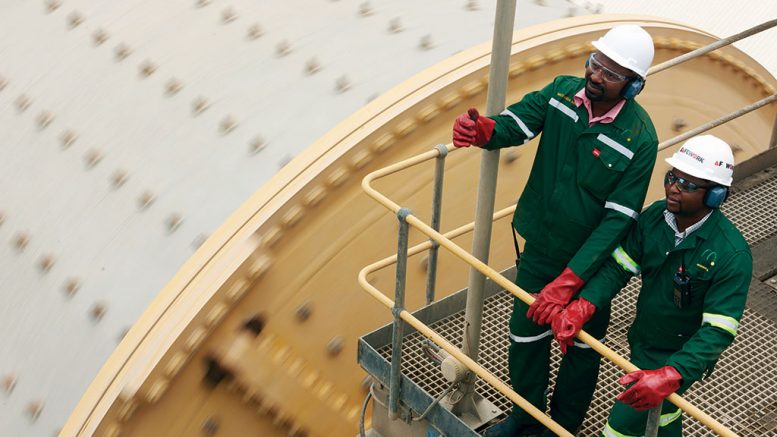Low cobalt prices and higher taxes under the new mining code in the Democratic Republic of the Congo have combined to make Glencore’s (LON: GLEN) Mutanda cobalt and copper operation uneconomic, the company says.
Mutanda — the world’s largest cobalt mine — will transition to care and maintenance by year-end. Last year the mine produced 27,000 tonnes cobalt (20% of the world’s supply of the metal) and 200,000 tonnes copper.
“The suspension of Mutanda should put a floor under cobalt prices, given the extent of production removed from the cobalt market, which is likely to make purchasers nervous,” BMO analyst Colin Hamilton says in a research note to clients. “Indeed, this effectively removes the surplus we have in the cobalt market over the next couple of years.”
Stratfor, a geopolitical intelligence publisher based in Texas, notes that “new mines in different countries will likely come online in the future, but for the moment, companies that deal in cobalt have few other options than accommodating the hard-line government in Kinshasa that looks to squeeze as much advantage as it can from its current supply stranglehold.”
Stratfor also points out that pressure has been mounting on Glencore’s operations in the DRC for more than a year.
“These include international criticism over Glencore’s association with Israeli businessman Dan Gertler, who has been sanctioned by the U.S.; legal battles between Glencore and state-owned Gécamines; the country’s new mining codes and its tenfold increase in royalty taxes on cobalt; and recent security issues at its mines. Even though longtime President Joseph Kabila left office after the elections that named his successor, a fraction of the Congolese government loyal to him has maintained control over the mining sector, indicating that the country’s mining strategy is unlikely to change.”

Facilities at Glencore’s Mutanda copper-cobalt mine in the Democratic Republic of the Congo. Credit: Glencore.
Longer term, the decision to put Mutanda on care and maintenance and conditions in the DRC may also impact the future composition and mix of metals used in the battery sector. (Cobalt is a component in lithium-ion batteries.) “Sustained higher prices or the departure of other cobalt producers from the DRC would benefit the battery makers that have strategically begun to move away from cobalt,” Stratfor notes. “Chinese battery manufacturer CATL, for example, reported they started producing lithium-ion batteries with limited cobalt content in April 2019 as part of China’s aggressive push to expand manufacturing capacity overall. Tesla Inc. has also announced plants to limit cobalt content in its batteries.”
The closure of Mutanda was announced along with the company’s first-half financial results on Aug. 7.
The Anglo-Swiss miner and commodities trader reported adjusted earnings before interest, tax, depreciation and amortization (EBITDA) during the first six months of the year declined 32% year-on-year to US$5.6 billion, down from US$8.18 billion. Net income attributable to equity holders declined from US$2.8 billion in the first half of 2018 to US$0.2 billion in the first half of 2019, reflecting the lower adjusted EBITDA and US$0.9 billion in impairment charges related to its Chad oil and African copper assets.
Glencore’s performance “reflected a challenging economic backdrop for our commodity mix, as well as operating and cost setbacks within our ramp-up and development assets,” Glencore CEO Ivan Glasenberg says in a press release.
Average price benchmarks for its key commodities all declined during the six-month period, with copper down 11%, zinc down 16%, lead down 20%, nickel down 11%, cobalt down 58% and Newcastle coal down 14%.
“Heightened global trade policy tensions, U.S. dollar strength and volatile interest rate curves again proved to be the central influences on markets during the first half,” Glasenberg says. “While U.S. equity markets tested fresh highs, in the absence of other specific drivers, commodity markets struggled amidst increasing fears that actual and potential new tariffs would harm global manufacturing and consumer sentiment, resulting behaviour and with it, global growth expectations.”
On the bright side, Glasenberg says the price moves for most of its commodities in the first half of 2019 “are not representative of underlying supportive fundamentals.” He continues that “visible metal stocks in key industrial metals — including copper, zinc and nickel — are at relatively low levels, while demand growth is in positive territory and mine supply is underperforming. Furthermore, coal demand in Asian markets continues to be strong.”
Glencore’s African copper assets were among the hardest hit. Revenue from Katanga, Mutanda and Mopani came in at US$1.54 billion in the first six months of 2019, down 27% from the US$2.13 billion posted in the same period last year.
“Our African copper business did not meet expected operational performance,” Glasenberg said. “We have moved to address the challenges at Katanga and Mopani with several management changes, as well as overseeing a detailed operational review, targeting multiple improvements to achieve consistent, cost-efficient production at design capacity. Our teams have identified a credible roadmap towards delivering on the significant cash-flow generation potential of these assets, at targeted steady-state production levels.”
At the end of June, Glencore’s debt stood at US$16.3 billion, up from the US$14.75 billion the company reported at the end of last year.
“The new debt number exceeds Glencore’s self-imposed ceiling of US$16 billion, although accounting changes mean that US$865 million of leases now have to be included,” Edward Sterk of BMO Capital Markets notes.


Be the first to comment on "Glencore to mothball Mutanda"